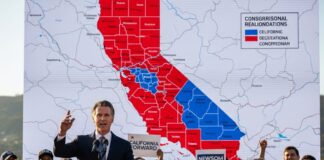
In a troubling blow to representative government, a Utah judge has thrown out the congressional map passed by the state’s elected Legislature. This map, drawn by lawmakers accountable to voters, was meant to reflect the will of Utah’s citizens. Instead, Judge Dianna Gibson—appointed by a former Republican governor—chose to override the people’s voice and install a map favored by left-wing activist groups. And just like that, Democrats have a shot at capturing a seat in deep-red Utah, not by earning the support of voters, but through the courts.
This is not how our constitutional system is supposed to work.
At the heart of this issue is the separation of powers. The U.S. Constitution, and the constitutions of each state, assign the job of drawing congressional districts to state legislatures—not to judges, and certainly not to unelected commissions. Article I, Section 4 of the U.S. Constitution is clear: the “Times, Places and Manner of holding Elections for Senators and Representatives, shall be prescribed in each State by the Legislature thereof.” That’s not vague. It’s plain language that puts redistricting in the hands of lawmakers chosen by the people.
Yet Judge Gibson has taken it upon herself to override Utah’s Legislature and install a map drawn by the League of Women Voters and a group called Mormon Women for Ethical Government—organizations with clear partisan leanings. Her ruling rests on a 2018 ballot initiative that created an “independent” redistricting commission. But when voters passed that measure, they did not rewrite the Utah Constitution. In fact, the Legislature later passed a law making the commission advisory only, as is their right under the state’s governing framework.
The judge’s decision ignores this. Worse, it substitutes the preferences of political activists for the choices of elected representatives. This is not neutrality. This is judicial activism, plain and simple.
Let’s be clear: redistricting is always a political process. That’s why we elect our lawmakers—to make these decisions on our behalf. If voters don’t like how their districts are drawn, they can vote their representatives out. That’s how democracy works. But when judges step in and impose their own maps, they take power away from the people and hand it to interest groups who never won an election.
This kind of judicial overreach is not new. We’ve seen similar moves in other states where Democrats and their allies in the courts have tried to redraw the map in their favor. In California, Governor Gavin Newsom just pushed through a gerrymandering scheme that could give Democrats up to five more seats. In Virginia and Maryland, Democrats are rushing to redraw lines to tilt the playing field their way before the 2026 midterms. The pattern is clear: when they can’t win at the ballot box, they try to win in the courtroom.
Thankfully, Republican-led states like Texas, Missouri, and North Carolina are standing firm and using their constitutional authority to draw fair maps that reflect their voters’ values. President Trump has encouraged these efforts, reminding states that they have every right—and indeed, a duty—to protect the voice of their citizens.
But in Utah, that duty has now been trampled by a single judge. And the consequences could be long-lasting. If unelected judges can override elected legislators anytime they disagree with a decision, then we no longer have self-government—we have rule by the bench.
That’s why Utah lawmakers must not sit idly by. State Rep. Matt MacPherson is right to call this a “gross abuse of power.” His proposal to begin the impeachment process for Judge Gibson is a serious and necessary step. Judges are not kings. If they violate their oath or exceed their authority, they must be held accountable.
Our Founders warned that liberty would never be safe if power were concentrated in any one branch of government. They created checks and balances to prevent just this kind of judicial overreach. It’s time for Utah, and every state, to defend those principles.
The people should choose their representatives—not the courts. That’s the American way.



